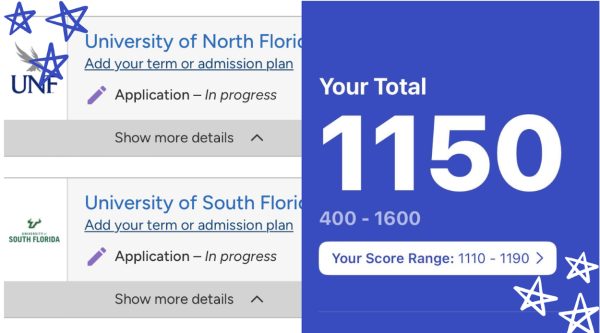SHOULD STUDENTS BE REQUIRED TO TAKE FOREIGN LANGUAGES?
A classroom in Warrior is brightly decorated as a space of language learning– but should it be required?
April 17, 2018
NO: STUDENTS NOT FOR-EIGN LANGUAGES
By Leyton Dudley, Reporter
Foreign language classes are known to be challenging but rewarding if the right amount of work and effort is put in. However, students at SHS– especially those in the Health Academy Program– hold a strong belief that foreign language classes should be optional to them due to the fact that they already have to learn another language: the Language of Medicine.
“I think the medical terminology should count as another language. Essentially, it’s based in Latin and medical terms are really a different language for most people. [LOM] is based off of Latin, it should be sufficient enough to satisfy a foreign language requirement. Of course, there is tremendous value in being able to speak a second language,” said Health Science teacher Dr. Peter Satto.
“I think the medical terminology should count as another language. Essentially, it’s based in Latin and medical terms are really a different language for most people. [LOM] is based off of Latin, it should be sufficient enough to satisfy a foreign language requirement. Of course, there is tremendous value in being able to speak a second language.”
— Dr. Peter Satto, Health Science Teacher
The Language of Medicine involves learning complex vocabulary and understanding human body systems. Since Health Academy students prioritize learning this skill, it would be beneficial to have an optional foreign language course.
Sophomore Lauren White, a Health Academy and Spanish student said, “I like being an LOM student. I have noticed that it has helped me understand certain [medical terms] better, especially since I’m taking medical skills this year. I have never had a time, though, where I have needed to know Spanish outside of school. I have basically learned the same vocabulary throughout high school and I know I will never be fluent in the language.”
In fact, less than 1% of American adults are proficient in a foreign language that they learned in a U.S. classroom. Therefore, high school foreign language education does not necessarily prepare students for the future, as other courses could.
Some students, especially those in Health Academy, already know the future career they would like to pursue. This helps them focus more on taking courses that would support their path to their profession in the future, like extra Advanced Placement (AP) classes or electives that relate to their interests.
However, International Baccalaureate (IB) students are required to take four foreign language classes as part of their international education. Widely regarded as the bane of their GPA’s existence, IB students have to complete this requirement regardless of the school board’s policy as it is a requirement for their IB diploma. Combined with the already-restrictive courses of IB, the foreign language classes make IB schedules very tight.
IB freshman Kruthi Munugeti said, “When I get into my junior year, I will only have room for one elective, because of my foreign language class. Although it is important for students to know the true basics of a foreign language, forcing students to take a certain amount of [these classes] is not a great idea.”
Ultimately, it should be the student’s academic decision to decide whether they would like to participate in foreign language courses. In order to do this, the school system would have to change their graduation requirement, allowing students to have more freedom in their classes while also better preparing themselves for the future.
YES: FOREIGN LANGUAGES EXPAND HORIZONS
By Mahek Shaikh, Activities Manager
While many students groan over the monotony and difficulty of learning another language, the benefits associated with being fluent in a foreign tongue outweigh the drawbacks. From enhancing one’s problem-solving abilities to improving one’s memory, the advantages of being bilingual are countless; therefore, foreign language classes should be a mandatory aspect of public education.
At Seminole High, students in Health Academy and the IB program are required to take a foreign language course for a minimum of four years in order to graduate with that specific diploma. IB French and Spanish are offered to IB students, while Health Academy students are able to take American Sign Language in addition to French or Spanish. However, students in the traditional diploma program are not required to take a foreign language course, minimizing the number of students learning a foreign language.
Regardless of the specifics of each program, all high school students should be required to take a foreign language course in order to enhance multiple learning abilities, specifically decision-making skills, attention spans, and level of creativity. Although many students argue that having a mandatory foreign language course increases the amount of coursework and homework students have, the skills learned from learning another language offset this added workload, helping students to benefit in the long run.
IB senior Sarah Walck is attending the University of North Florida in the fall and plans to become a sign language interpreter. Her decision was largely influenced by her four years in ASL at SHS.
“ASL classes have educated me on the struggles of people in the deaf community and have made me more aware of ways that I can help people in my life with hearing impairments. Taking ASL at SHS has helped guide my career path, as I now know I want to teach deaf students and interpret for deaf people. Mrs. Garrett and Ms. Vanover both gave me the skills and guidance I needed to make that dream of helping people a reality,” said Walck.
“ASL classes have educated me on the struggles of people in the deaf community and have made me more aware of ways that I can help people in my life with hearing impairments.”
— Sarah Walck
As well as helping students develop skills necessary to succeed in the future, foreign language courses can introduce students to new cultures that accompany those languages. For example, in IB French, students are exposed to various aspects of the French culture in order to aid in their learning of the language.
“IB French helped me learn about even more cultures than just French culture,” said IB senior Varisa Gumpangkum. “Since French is one of the main languages spoken in Africa and Mr. Debarros is from Senegal, we learned a lot about culture in Africa too.”
As times change and technology continues to develop, students must not forget the universality of language, and the necessity to continue to learn different languages in order to communicate with wider populations.



































